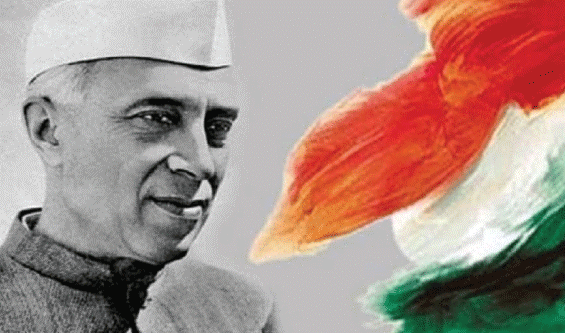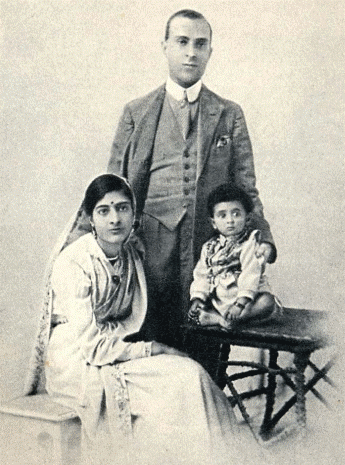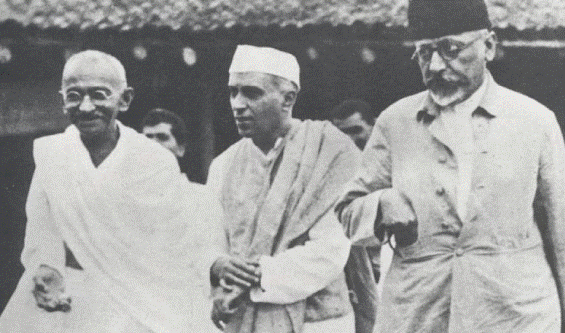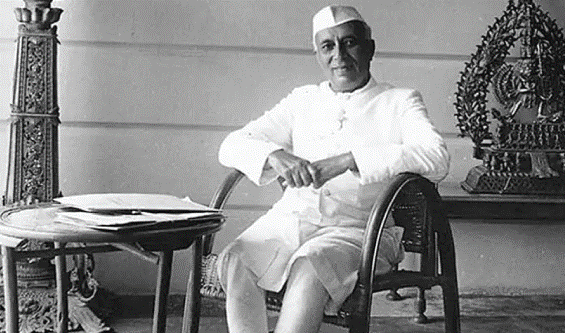Jawaharlal Nehru - Biography
Introduction
Jawaharlal Nehru, often known as Pandit Nehru. Jawaharlal Nehru was birthed on November 14, 1889, in Allahabad, India and was India's first prime minister (1947–64), founding the parliamentary system of government and becoming known for his neutralist (nonaligned) foreign policy. He was also a key figure in India's independence movement in the 1930s and 1940s. Nehru was an Indian nationalist politician and statesman who served as the country's first prime minister after independence in 1947. His birthday is honored as Children's Day in India. Nehru was India's first Prime Minister who served for the longest.

Family
Jawaharlal Nehru, the son of Motilal Nehru, a distinguished lawyer and Indian nationalist, and Nehru’s mother, Swarup Rani Thussu (1868–1938), Motilal Nehru’s second wife was from a familiar Kashmiri Brahmin family located in Lahore; his first wife died in delivery. Jawaharlal Nehru was the eldest of three siblings. Vijaya Lakshmi, his elder sister, eventually became the first female president of the United Nations General Assembly. Krishna Hutheesing, his youngest sister, became a well-known novelist and wrote numerous novels about her brother.

Education
- During his adolescence, Nehru became a fervent patriot. In October 1907, Nehru enrolled in Trinity College, Cambridge, and graduated with honors in natural science in 1910. During this time, he was interested in politics, economics, history, and literature. Bernard Shaw, John Maynard Keynes, Bertrand Russell, H. G. Wells Lowes Dickinson, and Meredith Townsend impacted much of his political and economic views. After obtaining his degree in 1910, Nehru moved to London to study law at the Inner Temple Inn. He continued to research Fabian Society thinkers such as Beatrice Webb during this period. In 1912, he was admitted to the bar.
- Nehru returned to India in August 1912 and enrolled as an advocate of the Allahabad High Court, attempting to establish himself as a barrister. But, unlike his father, he had no interest in his career and disliked both the practice of law and the society of lawyers. His commitment to nationalist politics was to supplant his law profession gradually.
Love Life
Nehru married Kamala Kaul, from a Kashmiri family who had relocated to Delhi, shortly after his return to India in March 1916. Indira Priyadarshini, their only child, was born in 1917; she subsequently served as Prime Minister of India (1966–77 and 1980–84) under her married name, Indira Gandhi. In addition, Indira Gandhi's son Rajiv Gandhi took over as Prime Minister from his mother (1984–89).
Past life
Nehru referred to his boyhood as "sheltered and uneventful." He grew in a privileged environment, with a huge palace named the Anand Bhavan. His father had private governesses and tutors to teach him at home. Nehru grew interested in science and theosophy after being influenced by the teachings of Irish theosophist Ferdinand T. Brooks. At the age of thirteen, he was introduced to the Theosophical Society by a family acquaintance, Annie Besant. However, his passion for theosophy did not last, and he left the group shortly after Brooks left as his instructor. "For over three years [Brooks] was with me, and he affected me immensely in many respects," he wrote. Nehru's seven years in England placed him in a foggy half-world, neither at home in England nor in India. "I have become a weird blend of East and West, out of place everywhere, at home nowhere," he wrote years later. He returned to India to learn more about it. The competing pulls and strains that his international experience was to put on his psyche were never fully reconciled.
Nationalist movements that had a major influence on the country:
Britain and India's comeback (1912-1913)
Nehru attended an annual session of the Indian National Congress in Patna within months of his return to India in 1912. Nehru questioned Congress's efficiency but decided to work for the party in support of Mahatma Gandhi's Indian civil rights fight in South Africa, collecting finances for the effort in 1913. Later, he campaigned against indentured servitude and other forms of prejudice against Indians in British territories.
World War I (1914-1915)
When World War I broke out, India's sympathies were divided. After the war, Nehru emerged as a leader whose political beliefs were deemed extreme. He mocked the Indian Civil Service for allegedly backing British policy. Someone once classified the Indian Civil Service, "with which we are sadly still plagued in our nation, as neither Indian, civil nor a service," he said. Motilal Nehru, a well-known moderate campaigner, acknowledged the limitations of constitutional agitation but warned his son that there was no other "practical alternative." Nehru, on the other hand, was unsatisfied with the speed of the national movement. He became engaged with strong nationalist leaders who advocated for Indian home rule.
Home Rule Movement (1916-1917)
In 1916, Besant organized a Home Rule League. Tilak had created his league in April 1916, after being released from prison. Nehru was a member of both leagues, but largely of the former. Another event that ushered in a fundamental shift in Indian politics was the acceptance of Hindu-Muslim cooperation with the Lucknow Pact at the Congress's annual conference in December 1916. The pact was formed earlier this year in Allahabad during a meeting of the All India Congress Committee at the Nehru house, Anand Bhawan.
Non-cooperation
Nehru's first significant national participation was in 1920, at the start of the non-cooperation campaign. He was the movement's leader in the United Provinces (now Uttar Pradesh). Nehru was detained in 1921 on suspicion of anti-government activities and freed a few months later. Nehru remained loyal to Gandhi and did not join the Swaraj Party created by his father, Motilal Nehru, and CR Das, despite the division that occurred inside the Congress as a result of Gandhi's unexpected suspension of the non-cooperation movement following the Chauri Chaura incident. Nehru was imprisoned in Nabha, a princely state, in 1923 when visiting the Sikhs in their fight against the corrupt Mahants.
Declaration of Independence
Declaration of Independence on New Year's Eve 1929, Nehru unfurled the tricolor flag of India on the banks of the Ravi in Lahore at midnight. A declaration of independence was read aloud, which included a willingness to withhold taxes. When the large crowd of people attending the event was asked if they agreed with it, the majority of them raised their hands in support. In favor of the motion and conformity with the Indian popular mood, 172 Indian members of national and provincial legislatures resigned. The Congress requested that the people of India mark January 26 as Republic Day. Volunteers from the Congress Party, nationalists, and members of the general public raised the Indian flag in public around the country.

Salt March (1930)
Nehru and the majority of Congress leaders were first skeptical of Gandhi's intention to launch civil disobedience with a satyagraha against the British salt tariff. They realized the potency of salt as a symbol when the demonstration gained traction. Aboard 14 April 1930, he was caught on a train from Allahabad to Raipur. He had formally made some illicit salt earlier, after addressing a large gathering and conducting a large parade. He was prosecuted for violating the salt legislation and sentenced to six months in Central Jail. During his confinement, he recommended to Gandhi that he succeed him as Congress president, but Gandhi turned him down, and Nehru chose his father as his successor.
Achievements as Prime Minister
- Prime Ministerial Achievements Despite the disaster of the brief conflict with China in 1962, Nehru remained the people's idol throughout the 35 years during1929, when Gandhi selected Nehru as president of the Congress session in Lahore, and his death as prime minister in 1964. His secular political approach contrasted with Gandhi's religious and traditionalist attitudes, which had given Indian politics a religious cast during Gandhi's lifetime—misleadingly so, while Gandhi appeared to be a religious conservative, he was a social nonconformist attempting to secularise Hinduism.
- Nehru is significant in Indian history because he imported and transmitted contemporary ideas and methods of thinking, which he adapted to Indian surroundings. Apart from emphasizing secularism and India's fundamental unity, despite its ethnic and religious diversity, Nehru was intensely concerned with bringing India into the contemporary age of scientific discovery and technical growth. One of his most notable accomplishments was the modification of the old Hindu civil code, which allowed Hindu widows to be treated equally with males in areas of inheritance and property.
- Throughout Nehru's tenure as Prime Minister, the Kashmir area, which is claimed by both India and Pakistan, remained a constant issue. In the months after the subcontinent's partition in 1947, he attempted to mediate a solution between the two new countries, while Hari Singh, the maharaja of Kashmir, decided which country he would join. However, when Singh selected India, violence erupted between the two countries. The United Nations mediated a cease-fire line in the region, and Nehru suggested territory changes along the line, which were rejected. That line of demarcation became the line of control that today divides the region's Indian and Pakistani administrations.
- When India ultimately struck, Nehru was able to say that neither he nor the Indian government had ever been dedicated to nonviolence as a policy.

Death
On his way back from Dehradun on May 26, 1964, he was feeling very at ease and went to bed at 23:30 as usual. He slept well till around 06:30 a.m. Nehru complained of back pain shortly after returning from the restroom. He spoke to the medics who were treating him for a short time before collapsing. He remained unconscious until early in the afternoon, when he died. His death was reported in the Lok Sabha on May 27, 1964, at 14:00 local time; the cause of death was assumed to be a heart attack.
Jawaharlal Nehru's corpse was draped in the Indian national Tricolor flag and displayed to the public. As the body was placed on the platform, the words "Raghupati Raghava Rajaram" were recited. Nehru was cremated by Hindu rites on May 28 at the Shantivan on the banks of the Yamuna, in front of 1.5 million mourners who crammed into Delhi's streets and the cremation grounds.
Writings
While imprisoned, Nehru wrote
- The Discovery of India
- Glimpses of World History
- An Autobiography, and
- Letters from a Father to His Daughter. Letters contained 30 letters sent to his daughter Indira Priyadarshani Nehru (later Gandhi), who was 10 years old and attending a boarding school in Mussoorie at the time. It attempted to teach her about natural history and foreign civilizations.
- The British publication The Guardian ranked Nehru's speech A Tryst With Destiny as one of the greatest speeches of the twentieth century.
Honors
Nehru was awarded an honorary doctorate by the University of Mysore in 1948. Later, he was awarded honorary doctorates by the University of Madras, Columbia University, and Keio University. Nehru was given the Bharat Ratna, India's highest civilian honor, in 1955 because Nehru was Prime Minister at the time, President Rajendra Prasad bestowed the honor on him without consulting the Prime Minister, as is customary under the Constitution.